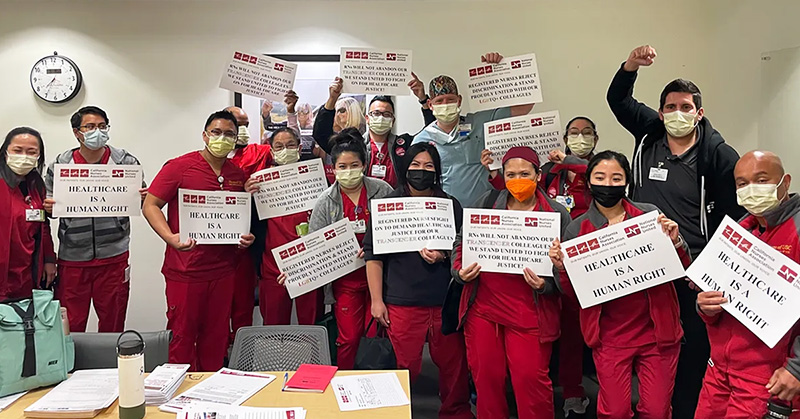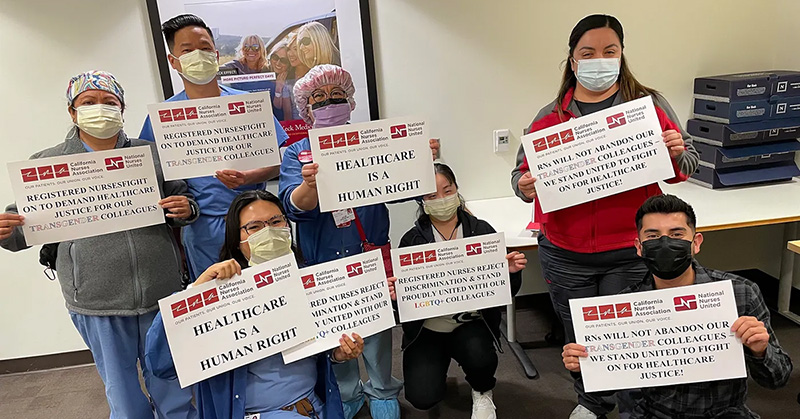Blog
How a nurse rallied her union to fight for gender-affirming care
To honor International Transgender Day of Visibility, National Nurses United is proud to share this story from nurse-member Dara Tep, RN, and her colleagues.
When Dara Tep, RN, first began transitioning her gender, it was the early days of Covid-19, and the solitude and masking helped her feel more comfortable trying to find her true self. Despite the hardships of being a nurse during a global pandemic, she was finding some hope in taking steps towards the happiness she wanted in life as a trans woman.
After a year on hormone replacement therapy — the typical wait time under most insurance coverage plans — she began pursuing gender-affirming surgeries. Starting in November of 2022, she started working with doctors to get access to the care she needs to feel safe, comfortable, and happy moving through the world. While the three doctors she saw all agreed the procedures she wanted were medically necessary, she was hitting a wall with her insurance company, Anthem Blue Cross of California.
“When I was starting my surgery process, I saw three different doctors who all said these procedures were medically necessary, and even in the clinical documentation they sent over to the health insurance company, ‘medically necessary’ is bolded and underlined,” she said.
Tep knew that she wasn’t the first trans person to be denied gender-affirming health care, especially surgeries. Trans people often report struggling to get their gender-affirming care covered by insurance, but the denials had a special irony for Tep, who works at Keck Medicine of USC, an organization that prides itself on the gender-affirming care program it launched last December. The third doctor Tep went to works at the same hospital as her, and she’d hoped that working with a surgeon at her employer would boost her chances for approval. But it didn’t.
“Whenever I would talk to human resources or anybody, I was always getting referred to pages 50 and 51 in our policy plan book, and that specific sentence is a blanket exclusion that states these procedures are considered cosmetic and not medically necessary,” Tep explained. “It just felt disappointing. It felt lonely. It felt like I was given up on. I felt like I didn’t have anyone to support me in my health care.”
She got that response over and over from USC’s human resources, from the insurance company, and from a third-party company that administered their health plan. Tep eventually went to the California Department of Insurance, but was told they had no jurisdiction over her plan. That’s when Tep turned to her union.

The day after reaching out, Tep met with her coworkers to explain the situation and was showered with an outpouring of support. A stark contrast to the frustration and isolation she’d felt throughout her fight, she was suddenly surrounded by other nurses who were not only empathetic to her situation, but disgusted by the fact that the same care they offered their community was being denied to staff. And they were ready to fight for her.
“The response from my coworkers was an immense amount of support and immense amount of solidarity,” Tep said. “Everyone messaged me right after the meeting, just letting me know personally about their support. The next day at work, walking around the hospital, people were recognizing my name or my face, and they were telling me how they were ready to support me and they were ready to fight and get this policy changed.”
“Going about in this world as a trans woman, you kind of feel like the world is against you, and having this amount of support was very euphoric and it was very great,” she added. “Instead of feeling alone in this fight, I really felt like I had a village with me, prepared to fight.”
The nurses she works with started a petition to pressure management, and Tep said she saw a noticeable difference in how communicative USC’s HR became as soon as her fellow union nurses intervened.
“After my union got involved, management has been way more responsive,” she said. “Management responded more quickly and more openly than before.”

Eager to see if shifting policies are going to produce results, Tep is hopeful. While she’s still waiting for official approval, she feels energized to continue this fight as long as needed.
“In the beginning, it really felt like my voice was a whisper, like the things I was fighting for felt unheard,” she said. “Now, with the support of family, friends, coworkers, community members, and my union, it feels like we have a voice and we’re screaming, we’re telling USC and we’re telling the community that this is care we really deserve and really need, not just for me, but for everyone out there.”
Tep initially felt selfish about starting this fight for herself. But working with her union helped her see this policy has implications not just for her or other trans workers on staff, but for their family members who need gender-affirming care, too. And she hopes that by sharing her story with the world, she can help inspire others to fight for their health care, too.
“I’m sharing my story to show that anyone and everyone can fight for the right to health care,” Tep said. “I’m sharing my story so others can see that coming together can bring a voice to the table and fight for what we deserve.”